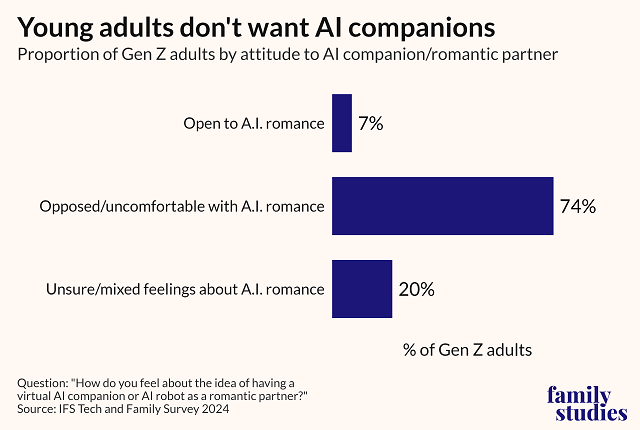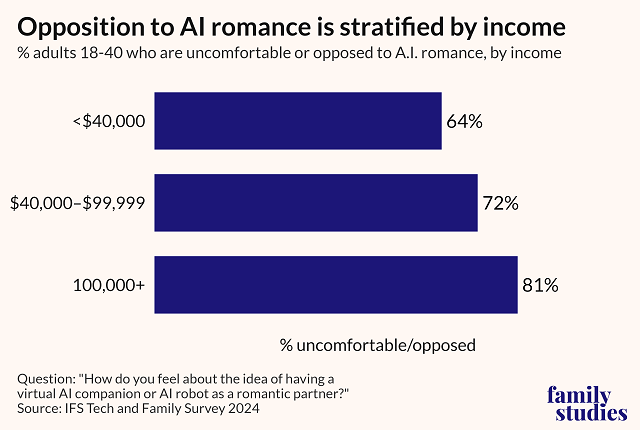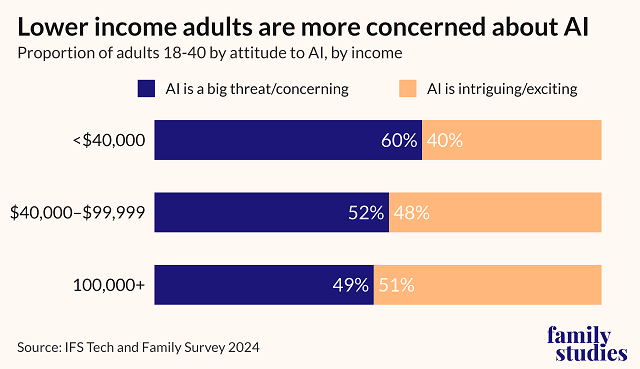Highlights
- If 1 in 5 Gen Z Americans are correct that we are heading toward a future where human love can be replaced by romance with machines, only predatory Big Tech companies will benefit. Post This
- Lower-income Americans believe more strongly that AI relationships are coming, and they are also more likely to see AI as a destructive force. Post This
- 74% of young Americans in our survey report that they are uncomfortable with AI romance or simply find it unethical. Post This
The future that Big Tech wants to build with AI is coming into focus. Elon Musk recently released a new feature on X: AI “companions,” in which users can chat with a suggestively-dressed blonde anime girl willing to strip down to lingerie to reward user engagement.
X is not the only Big Tech giant to use AI to exploit the instinctive need of human beings for social and sexual connection. Meta began rolling out “digital companions” in 2023, which used erotic techniques to capture its audience. Mark Zuckerberg, according to leaked documents, vetoed guardrails on sexual messaging. The Wall Street Journal found that Meta’s AI could be used for “underage” pornographic roleplay (and that the company was more than likely aware of it). Character.AI, a chatbot company backed by Google and famed venture capital firm a16z, now has tens of millions of monthly users. It, too, is frequently used to engage in person-to-machine sexual fantasies.
The age of AI lovers is here, and it will have consequences for us all. As Jaron Lanier wrote earlier this year for The New Yorker, “If A.I. lovers are normalized a little—even if not for you personally—the way you live will be changed.” A nation in which humans are shacking up with machines is one that is squandering its own potential, as the love between human beings joins individuals and families together, and quite literally builds the future through the begetting and raising of children.

What does the rising generation, the target demographic for AI lovers, think about all this? Our research at the Institute for Family Studies with YouGov finds that a small but meaningful share of Gen Z adults, 7%, are open to AI romantic partners. However, a much larger share, 23%, believe that AI has the potential to replace real-life romantic relationships in the future. If 1 in 5 Gen Z Americans are correct that we are heading toward a future where human love can be replaced by romance with infertile machines, only predatory Big Tech companies will benefit.
Other research shows that there is reason to worry. The Wheatley Institute found that nearly 1 in 3 young men and 1 in 4 young women have “chatted with an AI system that simulates a romantic partner.” And Common Sense recently found that a third of teens have chosen to speak to AI “companions” about an important matter rather than confide in a fellow human being.
Our data show that opposition to AI romance is influenced by socio-economic status. When we asked unpartnered young adults how they felt about AI boyfriends and girlfriends, 80% of those with an income of $100,000 or more said they were opposed to or uncomfortable with the idea. But opposition significantly declined among less affluent respondents: only 64% of those with an income of less than $40,000 said they were against it.

Strikingly, when we asked these same income groups whether they viewed AI as good or bad, the results flipped. Lower-income Americans, we found, believe more strongly that AI relationships are coming, and they are also more likely to see AI as a destructive force.
This contradiction is not hard to explain. Marriage has become institutionally brittle among poorer and working-class American communities. In some places, full on “marriage deserts” have emerged. Compared with alternative relationship forms like cohabitation, marriage has proven to be most effective at providing individuals with lasting companionship, as well as children of one’s own. Marriage’s collapse in these communities, in other words, appears to be an open wound that AI companies will exploit.

Indeed, we found that those who are open to AI lovers are three times more likely to say they are “completely dissatisfied” with life. Where human relationships have become weak and thin, and where hope is in short supply, AI lovers will find their biggest markets.
There is a silver lining here: 74% of young Americans in our survey report that they are uncomfortable with AI romance or simply find it unethical. On the strength of this potentially-massive opposition, those who oppose the commercialization of such exploitative uses of AI should take heart. Recent battles against Big Tech have yielded impressive victories for citizen activists. A June 2025 Supreme Court ruling in Free Speech Coalition v Paxton found that age verification to block children from accessing porn sites is constitutional; dozens of laws have been passed in states around the country to make app stories, smartphones, and social media safe for kids; and the so-called AI moratorium—which would have blocked states from regulating AI for a full decade—was recently resoundingly defeated in the U.S. Senate, 99 to 1.
These victories underscore that Americans can collectively choose how AI affects them and their families. In other words, the 3-out-of-4 Americans who don’t want AI lovers can just say “no"—and, if they say it loud enough, America’s political class will hear them. Marriage, love, and community are indelibly key facets of what it means to be human, and it is good news that the vast majority of Americans still see it that way.
Grant Bailey is a Research Fellow at the Institute for Family Studies, Get Married Initiative. Michael Toscano is Senior Fellow and Director of the Family First Technology Initiative at the Institute for Family Studies.












